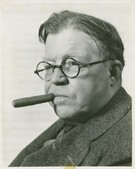Day Dream
If the American Dream is a religion, of sorts, so it has its sacred and its profane expressions. On the lofty side are the political ideals, the hopeful freedoms, the visions of equality; on the other are the dreams we pursue day to day, the quotidian aspirations that rouse us in the morning and comfort us to sleep at night. These are the personal dreams, not the public ones; those that respond to private yearnings, rather than a sense of the common good. They are the dreams of a modest, rebellious, and profound play from 1922: The Detour.
On Long Island—still quite rural in the ‘20’s—Helen Hardy’s life is not her own. Wife to a dogged farmer and mother of a devoted daughter, her days are largely defined by unending labors of cooking, cleaning, digging and planting. But she dreams of a place where “bein’ born an’ bein’ dead wasn’t the only things that ever happened.” Not that she would go herself; rather, Kate, her daughter, will—to New York, and there fulfill her evident talent as a painter. No idle fantasy, it has become the air Helen breathes, and she works towards it cent by cent, selling butter and eggs, eschewing any luxury herself, and hiding her money and her plans from her husband. Steve Hardy is a slave to the farm as well, but he doesn’t dream of escape. His small property yields enough staples to just make a living, and he dreams of living better. For that, he needs land—ever more land, and every spare dollar (including what he should have paid in taxes, or mortgage payments on what he already owns) goes to buying more.
In between is Kate, who timidly embraces her mother’s vision, while her own eyes are drawn to the handsome young man next door, Tom, himself dreaming of a future running a garage to serve the growing craze for automobiles. And when plans for improvements to the nearest highway force all four characters’ hands, their tightly bound but independent and hidden lives crack open with dramatic tremors.
Without Sound or Fury
Perhaps the most striking thing about the story of The Detour is how very simple and unembellished it is, for its very familiarity is the great part of its power. As heartbreaking as a missed connection, as uplifting as a forgotten love letter, and as dumbfounding as a whispered secret, the play is made up of deeply affecting confrontations. As theater holds the mirror up to nature, the most bracing shocks of The Detour come not from revelation, but recognition.
Purposefully rebelling against the caricatured portraits of rural folks that were popular on stage—hillbillies—Davis’s goal was to write a truthful account of farm people. He was also rebelling against the sensational melodramas that lingered into the 20th century’s popular theater, and that had made his own career up to this point, as well as the more expressionistic experiments of the modern stage. He was not the first dramatist to do so. In sympathy with an evolving, post-war popular taste, theater was delving into the psychological and the domestic drama. Eugene O’Neill would win the Pulitzer Prize in this year for Anna Christie. (Davis himself won the following year for his Icebound.) But Davis’s play is less histrionic than his more famous contemporary, still less beholden to melodrama, and for that subtlety truly a stunning piece of dramatic storytelling.
American Dreamers
However exact the portrait, ultimately, the lasting impact of The Detour is made by its resonance beyond the clarity of its likeness. Here may be the greatest surprise of this quite overlooked play for a contemporary audience: it not only captures the tenor of its time, it plays enduring American themes.
Helen’s dream of a better life for her child, built on her own years of work and sacrifice, could not be more plainly described. Steve’s monomaniacal fixation on acquiring more land, at all costs, is an American archetype. (It is also neatly countered by Tom’s young American yearning to give up farming so he can service a new technology.) The debate over Kate’s future is a debate over ownership—of self, of choice, of family, of property, even of fantasies. Underlying Helen’s dispute with Steve is the value of work, by which Steve measures all worth, and that Helen sees most worthy if it creates beauty. And these ordinary characters’ aspirations ache with the persistent tension between living in the pragmatic present and aspiring to an ideal future. Perhaps this tension is the most profound and most stirring chord the play sounds: what is the American Dream if it is not the right to pursue one’s dreams.
A play that asks the question with simple beauty, The Detour is Metropolitan’s third proud presentation in Season 21: The American Dream.
– Alex Roe
 Owen Davis (1874-1956) was best known in 1920 as the author of literally hundreds of light westerns, sex comedies, pot boilers and melodramas, whose great success on the turn-of-the-century touring circuit afforded him wealth and celebrity both. With The Detour, he took a decidedly different turn, in seeking to capture, as he writes in one of his autobiographies, “a simple picture of life as it is lived on a Long Island farm.”
Owen Davis (1874-1956) was best known in 1920 as the author of literally hundreds of light westerns, sex comedies, pot boilers and melodramas, whose great success on the turn-of-the-century touring circuit afforded him wealth and celebrity both. With The Detour, he took a decidedly different turn, in seeking to capture, as he writes in one of his autobiographies, “a simple picture of life as it is lived on a Long Island farm.”
A respectable run at the Astor Theater starred Effie Shannon, Angela McCahill, and Augustin Duncan (brother of Isadora, and also the play’s director), and pointed the way for Davis’s future efforts. This same impulse to escape the vulgar characterizations of rural life presented in the popular theater of the day led to rural Maine (where was born) and Icebound, winner of the 1923 Pulitzer Prize for Drama. These two are his best known serious works, but his were also the well-received adaptations of The Great Gatsby (1926); Pearl Buck’s The Good Earth (1932); Edith Wharton’s Ethan Frome (1926), and as well an English language version of Karel Capek’s From the Life of Insects that Davis entitled The World We Live In (1922).
